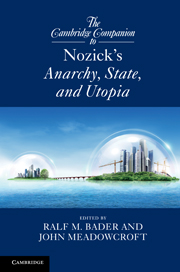3 - What we learn from the experience machine
from Part I - Morality
Published online by Cambridge University Press: 28 September 2011
Summary
A LITTLE PASSAGE WITH A BIG IMPACT
Nozick discusses the experience machine in a little (four paragraph) section of Chapter 3 of Anarchy, State, and Utopia (ASU). The section seems to be a mere speculative digression from Nozick's main line of argument, and yet it has come to be perhaps the most widely discussed passage of the book. It has been reprinted and paraphrased and discussed thousands of times. Yet it seems to me that the passage is a bit of a mystery - perhaps it functions as a kind of Rorschach test for readers. Different readers apparently fi nd different arguments in Nozick's remarks. It may seem that the various interpretations tell us more about the interests of the readers than about the argument that Nozick actually presented.
In section 3.2 I outline the context in which the controversial passage appears. What I say in this part may come as a surprise to anyone whose knowledge of the passage derives entirely from seeing it only as a selection in an anthology, isolated from its original context. After sketching the contents of the passage in section 3.3, I go on in section 3.4 to explain and evaluate some versions of one fairly popular interpretation of the argument. Under these interpretations, the argument is taken to be an attack on utilitarianism.
- Type
- Chapter
- Information
- Publisher: Cambridge University PressPrint publication year: 2011
- 12
- Cited by



